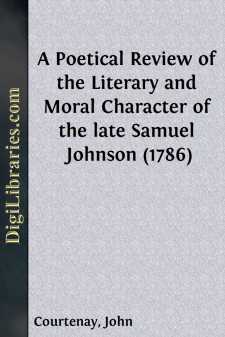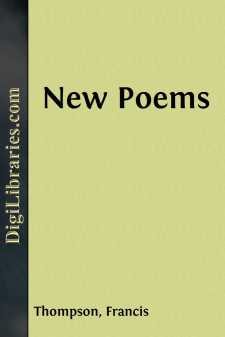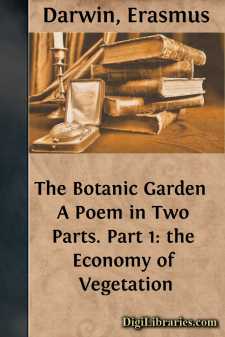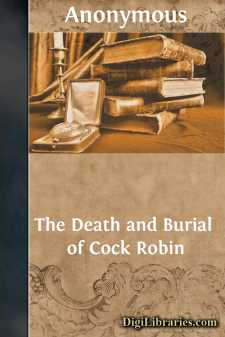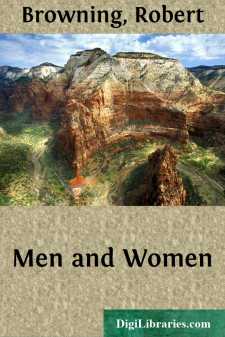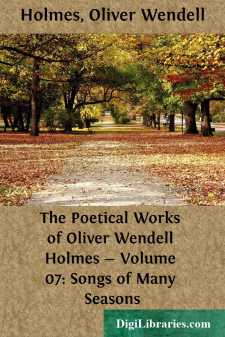Poetry
General Books
Sort by:
by:
John Courtenay
INTRODUCTION The eighteenth century was an age addicted to gossiping about its literary figures. This addiction was nowhere better demonstrated than by the countless reflections, sermons, poems, pamphlets, biographical sketches, and biographies about Samuel Johnson. The most productive phase of this activity commenced almost immediately after Johnson's death in December, 1784, and continued into...
more...
by:
Francis Thompson
SIGHT AND INSIGHT. 'Wisdom is easily seen by them that love her, and is foundby them that seek her.To think therefore upon her is perfect understanding.' WISDOM, vi. I Secret was the garden;Set i' the pathless aweWhere no star its breath can draw.Life, that is its warden,Sits behind the fosse of death. Mine eyes saw not,and I saw. II It was a mazeful wonder;Thrice three times it was...
more...
by:
Vachel Lindsay
The Chinese Nightingale Second Section America Watching the War, August, 1914, to April, 1917 Where Is the Real Non-resistant? Here's to the Mice! When Bryan Speaks To Jane Addams at the Hague I. Speak Now for Peace II. Tolstoi Is Plowing Yet The Tale of the Tiger Tree The Merciful Hand Third Section America at War with Germany, Beginning April, 1917 Our...
more...
by:
Erasmus Darwin
Oft tho' thy genius, D——! amply fraughtWith native wealth, explore new worlds of mind;Whence the bright ores of drossless wisdom brought,Stampt by the Muse's hand, enrich mankind; Tho' willing Nature to thy curious eye,Involved in night, her mazy depths betray;Till at their source thy piercing search descryThe streams, that bathe with Life our mortal clay; Tho',...
more...
by:
Anonymous
THE BURIAL OF COCK ROBIN. Here lies Cock Robin,Dead and cold;This book his endWill soon unfold. Who kill'd Cock Robin?I, said the Sparrow,With my bow and arrow,And I kill'd Cock Robin. This is the Sparrow,With his bow and arrow. Who saw him die?I, said the fly,With my little eye,And I saw him die. This is the Fly,With his little eye. Who caught his blood?I, said the Fish,With my little...
more...
by:
Robert Browning
INTRODUCTION Thirteen years after the publication, in 1855, of the Poems, in two volumes, entitled "Men and Women," Browning reviewed his work and made an interesting reclassification of it. He separated the simpler pieces of a lyric or epic cast—such rhymed presentations of an emotional moment, for example, as "Mesmerism" and "A Woman's Last Word," or the picturesque...
more...
OPENING THE WINDOW THUS I lift the sash, so longShut against the flight of song;All too late for vain excuse,—Lo, my captive rhymes are loose. Rhymes that, flitting through my brain,Beat against my window-pane,Some with gayly colored wings,Some, alas! with venomed stings. Shall they bask in sunny rays?Shall they feed on sugared praise?Shall they stick with tangled feetOn the critic's poisoned...
more...
CANTO I His glory, by whose might all things are mov'd,Pierces the universe, and in one partSheds more resplendence, elsewhere less. In heav'n,That largeliest of his light partakes, was I,Witness of things, which to relate againSurpasseth power of him who comes from thence;For that, so near approaching its desireOur intellect is to such depth absorb'd,That memory cannot follow....
more...
CANTO V FROM the first circle I descended thusDown to the second, which, a lesser spaceEmbracing, so much more of grief containsProvoking bitter moans. There, Minos standsGrinning with ghastly feature: he, of allWho enter, strict examining the crimes, Gives sentence, and dismisses them beneath,According as he foldeth him around:For when before him comes th' ill fated soul,It all confesses; and...
more...
A for Arab.This Arab is upset, I fear;Look at his pretty shield and spear.He's stuck two pistols in his sash,And, dear me, how his eyes do flash!At home he has a horse to ride;To "scour the desert" is his pride.His horse is of the purest breed;Some people call his horse a steed.Here is your little brother Boer,Of course, you've heard of him before;He has a naughty Uncle Paul,Who used...
more...


